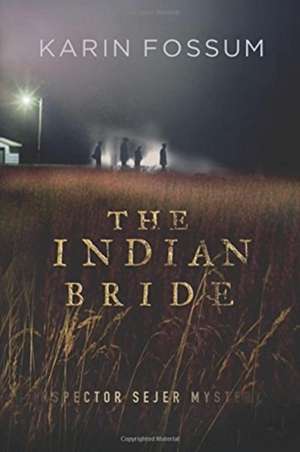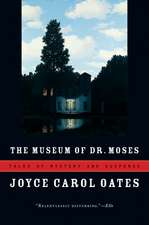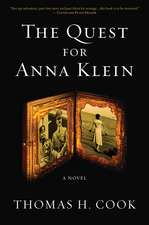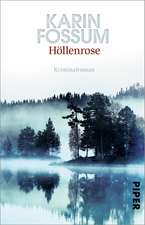The Indian Bride: Inspector Sejer Mysteries
Autor Karin Fossum Traducere de Charlotte Barslunden Limba Engleză Paperback – 31 mai 2008
When long-time bachelor Gunder Jomann goes to India for two weeks and comes home married, the town of Elvestad is stunned. Then, on the day his bride is supposed to arrive, the battered body of a woman is found on the outskirts of town. The "good people of Elvestad" can’t believe that anyone among them could be capable of such a crime. But in his quiet way, Inspector Konrad Sejer understands that no one is completely innocent—not the café owner who knows too much, the girl who wants the attention that comes with being a witness, or the bodybuilder with no outlet for his terrible strength.
Preț: 89.23 lei
Nou
Puncte Express: 134
Preț estimativ în valută:
17.07€ • 17.88$ • 14.16£
17.07€ • 17.88$ • 14.16£
Carte disponibilă
Livrare economică 19 martie-02 aprilie
Preluare comenzi: 021 569.72.76
Specificații
ISBN-13: 9780156033367
ISBN-10: 0156033364
Pagini: 320
Dimensiuni: 135 x 203 x 19 mm
Greutate: 0.3 kg
Ediția:First Edition
Editura: HMH Books
Colecția Mariner Books
Seria Inspector Sejer Mysteries
Locul publicării:United States
ISBN-10: 0156033364
Pagini: 320
Dimensiuni: 135 x 203 x 19 mm
Greutate: 0.3 kg
Ediția:First Edition
Editura: HMH Books
Colecția Mariner Books
Seria Inspector Sejer Mysteries
Locul publicării:United States
Recenzii
PRAISE
FORTHE
INDIAN
BRIDE
"Devastating . . . Fossum [is] able to see into the soul of an entire village."—Marilyn Stasio,The New York Times Book Review
"An irresistible page-turner that's like a Nordic Sherlock Holmes story, with characters by Bergman and blood by Tarantino.A-."—Entertainment Weekly
"Devastating . . . Fossum [is] able to see into the soul of an entire village."—Marilyn Stasio,The New York Times Book Review
"An irresistible page-turner that's like a Nordic Sherlock Holmes story, with characters by Bergman and blood by Tarantino.A-."—Entertainment Weekly
"Fossum
is
a
master
at
drawing
finely
detailed
suspects.
The
result:
an
irresistible
page-turner
that's
like
a
Nordic
Sherlock
Holmes
story,
with
characters
by
Bergman
and
blood
by
Tarantino.
A-"
Extras
Chapter
1
The silence is shattered by the barking of a dog. The mother looks up from the sink and stares out of the window. The barking comes from deep in the dog’s throat. All of its black, muscular body quivers with excitement.
Then she sees her son. He gets out of the red Golf and lets a blue bag fall to the ground. He glances toward the window, registering the faint outline of his mother. He goes to the dog and releases it from its chain. The animal throws itself at him. They roll on the ground, sending the dirt flying. The dog growls and her son shouts affectionate curses in its ears. Sometimes he yells at the top of his lungs and smacks the Rottweiler hard across its snout. At last it stays down. Slowly he gets to his feet. Brushes the dust and dirt from his pants. Glances once more at the window. The dog gets up hesitantly and cowers in front of him, its head down, until he allows it to come and lick the corners of his mouth, submissively. Then he walks to the house and comes into the kitchen.
“Good God, look at the state of you!”
The blue T-shirt is bloodstained. His hands are covered in cuts. The dog has scratched his face, too.
“Never seen anything like it,” she says and sniffs angrily. “Leave the bag. I’m doing a load of laundry later.”
He folds his scratched arms across his chest. They are powerful, like the rest of him. Close to two hundred pounds and not a hint of fat. The muscles have just been used and they are warm.
“Calm down,” he tells her. “I’ll do it.”
She can’t believe her ears. Him, wash his own clothes?
“Where have you been?” she says. “Surely you don’t work out from six to eleven?”
Her son mumbles something. He has his back to her.
“With Ulla. We were babysitting.”
She looks at the broad back. His hair is very blond and stands upright like a brush. Thin stripes have been dyed scarlet. It’s as if he were on fire. He disappears down the basement stairs. She hears the old washing machine start up. She lets the water out of the sink and stares into the yard. The dog has lain down with its head on its paws. The last remnant of light is disappearing. Her son is back, says he’s going to take a shower.
“A shower at this hour? You’ve just come from the gym?”
He doesn’t reply. Later she hears him in the bathroom, sounding hollow in the tiled space. He’s singing. The door to the medicine cupboard slams. He’s probably looking for a bandage, silly boy.
His mother smiles. All of this violence is only to be expected. He is a man, after all. Later, she would never forget this. The last moment when life was good.
It began with Gunder Jomann’s journey. Gunder went all the way to India to find himself a wife. When people asked, he did not say that that was why he had gone. He hardly admitted it to himself. It was a journey to see a bit of the world, he explained when his colleagues asked. What an outrageous extravagance! He never spent anything on himself. Hardly ever went out, never accepted invitations to Christmas parties, kept himself busy either with his house or his garden or his car. Had never had a woman either, so far as anyone knew. Gunder was not troubled by the gossip. He was in fact a determined man. Slow—it was undeniable—but he got where he wanted without making waves. He had time on his side. In the evenings when he was in his fifty-first year he sat leafing through a book—a present from his younger sister, Marie—People of All Nations.Since he never went anywhere except to and from his workplace, a small, solid business that sold agricultural machinery, she could make sure that at least he had the chance to see pictures of what went on in the great wide world. Gunder read the book and leafed through the illustrations. He was most fascinated by India. The beautiful women with the red dots on their foreheads. Their painted eyes, their flirtatious smiles. One of them looked back at him from the book and he was soon lost in sweet dreams. No one could dream like Gunder. He closed his eyes and flew away. She was as light as a feather in her red costume. Her eyes were so deep and dark, like black glass. Her hair was hidden under a scarf with golden frills. He had been gazing at the photograph for months. It was clear to him that he wanted an Indian wife. Not because he wanted a subservient and self-sacrificing woman, but because he wanted someone he could cherish and adore. Norwegian women didn’t want to be adored. Actually he had never understood them, never understood what they wanted. Because he lacked nothing, as far as he could see. He had a house, a garden, a car, a job, and his kitchen was well equipped. There was a heated floor in the bathroom, and he had a television and a video recorder, a washing machine, a dryer, a microwave, a willing heart, and money in the bank. Gunder understood that there were other, more abstract factors that determined whether you were lucky in love—he wasn’t an imbecile. However, it was not much use to him unless it was something that could be learned or bought. Your time will come, his mother used to say as she lay dying in the big hospital bed. His father had passed away years before. Gunder had grown up with these two women, his mother and his sister, Marie. When his mother was seventy she developed a brain tumor and for long periods she was not herself. He would wait patiently for her to once more become the person he knew and loved. Your time will come. You’re a good boy, you are, Gunder. One fine day a woman will come your way, you’ll see. But he did not see anyone coming his way. So he booked a flight to India. He knew it was a poor country. Perhaps he might find a woman there who could not afford to turn down his offer of following him all the way to Norway, to this pretty house, which belonged to him. He would pay for her family to come and visit, if they wanted to. He did not wish to separate anyone. And if she had some complicated faith, then he certainly would not stop her from observing it. There were few people as patient as Gunder. If only he could find a wife!
There were other options. But he did not have the courage to get on the bus to Poland with others, strangers. And he did not want to jump on a plane to Thailand. There were so many rumors about what went on there. He wanted to find a woman all by himself. Everything should be up to him. The thought of sitting down browsing through catalogs with photographs and descriptions of different women or staring at a TV screen where they offered themselves one after the other—that was unthinkable to Gunder. He would never be able to make up his mind.
The light from the reading lamp warmed his balding head. On a map of the world he found India and her principal cities: Madras, Bombay, New Delhi. He favored a city by the sea. Many Indians spoke English and he felt reassured by that. Some were even Christians, according toPeople of All Nations.It would be the most happy coincidence if he were to meet a woman who was perhaps a Christian and spoke English well. It mattered less whether she was twenty or fifty. He did not expect to have children, he was not overambitious, but if she had one, he would accept that as part of the deal. He might have to bargain. There were many customs in other countries so different from the ones here at home; he would pay handsomely if it was a question of money. His inheritance after his mother died was considerable.
First of all he needed to find a travel agency. There were four to choose from. One in the shopping center, consisting only of a counter that you stood leaning against while going through some brochures. Gunder preferred to sit. This was an important decision, not something you did standing up, in a hurry. He would have to go into town; there were three travel agencies there. He looked through the telephone directory. Then he remembered that Marie had once left a holiday brochure in his house to tempt him. So like Marie, he thought, and looked in the index under I. Ialyssos. Ibiza. Ireland. Were there no holidays in India? He found Bali under the Indonesian islands, but dismissed the thought. It was India or nothing. He would just have to ring the airport directly and book. He would manage as always, he always had, and in a big city they would be used to travelers. However, it was evening now and too late to call. Instead he turned the pages ofPeople of All Nationsonce more. For a long time he sat gazing at the Indian beauty. Imagine that a woman could be so wondrously pretty, so golden and smooth, so exquisitely delicate. She had gathered her shawl beneath her chin with a slender hand. She wore jewelry on her wrists. Her iris was practically black with a flash of light, from the sun perhaps, and she stared straight at Gunder. Into his longing eyes. They were large and blue and he closed them now. She followed him into his dream. He dozed in his chair and floated away with the golden beauty. She was weightless. Her blood-red costume fluttered against his face.
Copyright © J. W. Cappelens Forlag, A.S., 2001
English translation copyright © Charlotte Barslund, 2005
All rights reserved. No part of this publication may be reproduced or transmitted in any form or by any means, electronic or mechanical, including photocopy, recording, or any information storage and retrieval system, without permission in writing from the publisher.
Requests for permission to make copies of any part of the work should be submitted online at www.harcourt.com/contact or mailed to the following address: Permissions Department, Harcourt, Inc., 6277 Sea Harbor Drive, Orlando, Florida 32887-6777.
The silence is shattered by the barking of a dog. The mother looks up from the sink and stares out of the window. The barking comes from deep in the dog’s throat. All of its black, muscular body quivers with excitement.
Then she sees her son. He gets out of the red Golf and lets a blue bag fall to the ground. He glances toward the window, registering the faint outline of his mother. He goes to the dog and releases it from its chain. The animal throws itself at him. They roll on the ground, sending the dirt flying. The dog growls and her son shouts affectionate curses in its ears. Sometimes he yells at the top of his lungs and smacks the Rottweiler hard across its snout. At last it stays down. Slowly he gets to his feet. Brushes the dust and dirt from his pants. Glances once more at the window. The dog gets up hesitantly and cowers in front of him, its head down, until he allows it to come and lick the corners of his mouth, submissively. Then he walks to the house and comes into the kitchen.
“Good God, look at the state of you!”
The blue T-shirt is bloodstained. His hands are covered in cuts. The dog has scratched his face, too.
“Never seen anything like it,” she says and sniffs angrily. “Leave the bag. I’m doing a load of laundry later.”
He folds his scratched arms across his chest. They are powerful, like the rest of him. Close to two hundred pounds and not a hint of fat. The muscles have just been used and they are warm.
“Calm down,” he tells her. “I’ll do it.”
She can’t believe her ears. Him, wash his own clothes?
“Where have you been?” she says. “Surely you don’t work out from six to eleven?”
Her son mumbles something. He has his back to her.
“With Ulla. We were babysitting.”
She looks at the broad back. His hair is very blond and stands upright like a brush. Thin stripes have been dyed scarlet. It’s as if he were on fire. He disappears down the basement stairs. She hears the old washing machine start up. She lets the water out of the sink and stares into the yard. The dog has lain down with its head on its paws. The last remnant of light is disappearing. Her son is back, says he’s going to take a shower.
“A shower at this hour? You’ve just come from the gym?”
He doesn’t reply. Later she hears him in the bathroom, sounding hollow in the tiled space. He’s singing. The door to the medicine cupboard slams. He’s probably looking for a bandage, silly boy.
His mother smiles. All of this violence is only to be expected. He is a man, after all. Later, she would never forget this. The last moment when life was good.
It began with Gunder Jomann’s journey. Gunder went all the way to India to find himself a wife. When people asked, he did not say that that was why he had gone. He hardly admitted it to himself. It was a journey to see a bit of the world, he explained when his colleagues asked. What an outrageous extravagance! He never spent anything on himself. Hardly ever went out, never accepted invitations to Christmas parties, kept himself busy either with his house or his garden or his car. Had never had a woman either, so far as anyone knew. Gunder was not troubled by the gossip. He was in fact a determined man. Slow—it was undeniable—but he got where he wanted without making waves. He had time on his side. In the evenings when he was in his fifty-first year he sat leafing through a book—a present from his younger sister, Marie—People of All Nations.Since he never went anywhere except to and from his workplace, a small, solid business that sold agricultural machinery, she could make sure that at least he had the chance to see pictures of what went on in the great wide world. Gunder read the book and leafed through the illustrations. He was most fascinated by India. The beautiful women with the red dots on their foreheads. Their painted eyes, their flirtatious smiles. One of them looked back at him from the book and he was soon lost in sweet dreams. No one could dream like Gunder. He closed his eyes and flew away. She was as light as a feather in her red costume. Her eyes were so deep and dark, like black glass. Her hair was hidden under a scarf with golden frills. He had been gazing at the photograph for months. It was clear to him that he wanted an Indian wife. Not because he wanted a subservient and self-sacrificing woman, but because he wanted someone he could cherish and adore. Norwegian women didn’t want to be adored. Actually he had never understood them, never understood what they wanted. Because he lacked nothing, as far as he could see. He had a house, a garden, a car, a job, and his kitchen was well equipped. There was a heated floor in the bathroom, and he had a television and a video recorder, a washing machine, a dryer, a microwave, a willing heart, and money in the bank. Gunder understood that there were other, more abstract factors that determined whether you were lucky in love—he wasn’t an imbecile. However, it was not much use to him unless it was something that could be learned or bought. Your time will come, his mother used to say as she lay dying in the big hospital bed. His father had passed away years before. Gunder had grown up with these two women, his mother and his sister, Marie. When his mother was seventy she developed a brain tumor and for long periods she was not herself. He would wait patiently for her to once more become the person he knew and loved. Your time will come. You’re a good boy, you are, Gunder. One fine day a woman will come your way, you’ll see. But he did not see anyone coming his way. So he booked a flight to India. He knew it was a poor country. Perhaps he might find a woman there who could not afford to turn down his offer of following him all the way to Norway, to this pretty house, which belonged to him. He would pay for her family to come and visit, if they wanted to. He did not wish to separate anyone. And if she had some complicated faith, then he certainly would not stop her from observing it. There were few people as patient as Gunder. If only he could find a wife!
There were other options. But he did not have the courage to get on the bus to Poland with others, strangers. And he did not want to jump on a plane to Thailand. There were so many rumors about what went on there. He wanted to find a woman all by himself. Everything should be up to him. The thought of sitting down browsing through catalogs with photographs and descriptions of different women or staring at a TV screen where they offered themselves one after the other—that was unthinkable to Gunder. He would never be able to make up his mind.
The light from the reading lamp warmed his balding head. On a map of the world he found India and her principal cities: Madras, Bombay, New Delhi. He favored a city by the sea. Many Indians spoke English and he felt reassured by that. Some were even Christians, according toPeople of All Nations.It would be the most happy coincidence if he were to meet a woman who was perhaps a Christian and spoke English well. It mattered less whether she was twenty or fifty. He did not expect to have children, he was not overambitious, but if she had one, he would accept that as part of the deal. He might have to bargain. There were many customs in other countries so different from the ones here at home; he would pay handsomely if it was a question of money. His inheritance after his mother died was considerable.
First of all he needed to find a travel agency. There were four to choose from. One in the shopping center, consisting only of a counter that you stood leaning against while going through some brochures. Gunder preferred to sit. This was an important decision, not something you did standing up, in a hurry. He would have to go into town; there were three travel agencies there. He looked through the telephone directory. Then he remembered that Marie had once left a holiday brochure in his house to tempt him. So like Marie, he thought, and looked in the index under I. Ialyssos. Ibiza. Ireland. Were there no holidays in India? He found Bali under the Indonesian islands, but dismissed the thought. It was India or nothing. He would just have to ring the airport directly and book. He would manage as always, he always had, and in a big city they would be used to travelers. However, it was evening now and too late to call. Instead he turned the pages ofPeople of All Nationsonce more. For a long time he sat gazing at the Indian beauty. Imagine that a woman could be so wondrously pretty, so golden and smooth, so exquisitely delicate. She had gathered her shawl beneath her chin with a slender hand. She wore jewelry on her wrists. Her iris was practically black with a flash of light, from the sun perhaps, and she stared straight at Gunder. Into his longing eyes. They were large and blue and he closed them now. She followed him into his dream. He dozed in his chair and floated away with the golden beauty. She was weightless. Her blood-red costume fluttered against his face.
Copyright © J. W. Cappelens Forlag, A.S., 2001
English translation copyright © Charlotte Barslund, 2005
All rights reserved. No part of this publication may be reproduced or transmitted in any form or by any means, electronic or mechanical, including photocopy, recording, or any information storage and retrieval system, without permission in writing from the publisher.
Requests for permission to make copies of any part of the work should be submitted online at www.harcourt.com/contact or mailed to the following address: Permissions Department, Harcourt, Inc., 6277 Sea Harbor Drive, Orlando, Florida 32887-6777.
Notă biografică
KARIN FOSSUM is the author of the internationally successful Inspector Konrad Sejer crime series. Her recent honors include a Gumshoe Award and the Los Angeles Times Book Prize for mystery/thriller. She lives in Norway.





























